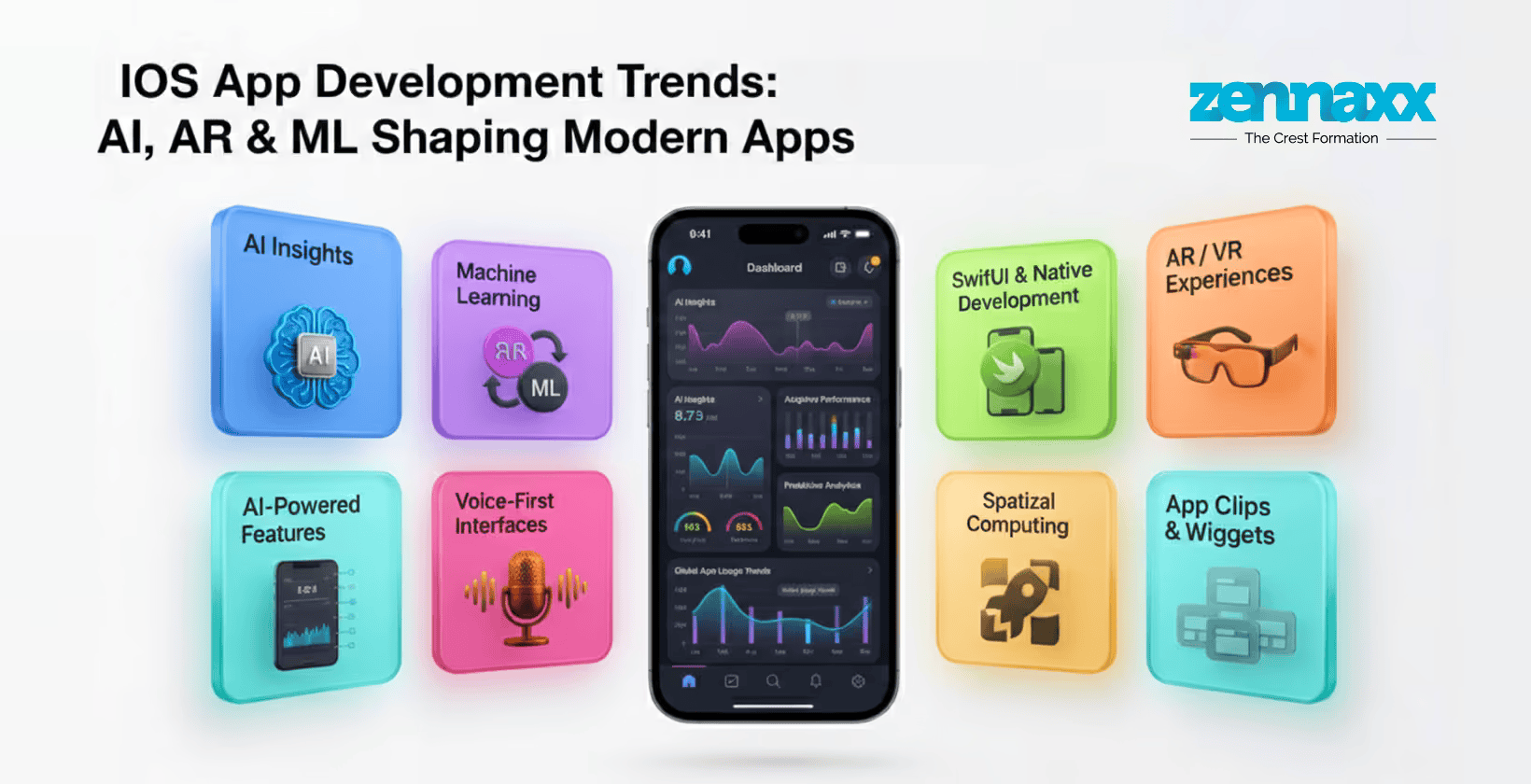The best mobile app development languages are Kotlin, Swift, Java, Dart, JavaScript, Objective-C, C#, C++, and Python. Mobile app development languages power native Android, native iOS, and cross-platform ecosystems, which enables developers to build fast and interactive mobile applications. A mobile app development programming language is a specialized language used to develop mobile applications that run on smartphones, tablets, and other mobile devices. Mobile app development language defines how mobile apps interact with device hardware, render user interfaces, and handle data across platforms.
Java was the first adopted programming language for mobile apps, which power early Android development and laying the foundation for today’s mobile SDKs. Kotlin and Swift are now the most preferred languages for native mobile development and are officially supported by Google and Apple for Android and iOS, respectively. Dart has rapidly emerged as a dominant cross-platform language, with Flutter now used in over 46% of hybrid mobile apps worldwide, according to Statista developer surveys. Python, while not native, has carved out a role in mobile for backend integration and fast prototyping using tools such as Kivy and BeeWare.
Listed below are the overall 9 best mobile app development languages to consider in 2025.
- Kotlin: Kotlin is the official Android development language backed by Google, which offers null safety, concise syntax, and full Java interoperability.
- Swift: Swift is Apple’s preferred language for iOS, iPadOS, and watchOS development, which delivers unmatched performance, safety, and tight integration with the Apple ecosystem.
- Java: Java continues to dominate enterprise-grade Android applications due to its rock-solid virtual machine, vast ecosystem, and compatibility with legacy code in large-scale deployments.
- Dart: Java powers Flutter-based apps with a single codebase across Android, iOS, web, and desktop to offer native-like performance and a fast-growing developer community focused on UI innovation.
- JavaScript: JavaScript enables high-performance cross-platform mobile apps through frameworks such as React Native and Capacitor.
- Objective-C: Objective-C strongly supports legacy iOS applications and integrates smoothly with Swift, which makes it essential for maintaining older Apple codebases still active in production.
- C#: C# powers mobile applications through the Xamarin and .NET MAUI frameworks to allow developers to share business logic across iOS, Android, and Windows using Microsoft’s modern toolchain.
- C++: C++ is used in mobile game engines and performance-critical modules to enable powerful, low-level control for rendering, sensor handling, and audio processing across both Android and iOS.
- Python: Python supports rapid backend development and mobile prototyping with frameworks such as Kivy and BeeWare, often serving startups and internal tools that need quick deployment and flexible logic.
1. Kotlin
Kotlin is a modern, statically typed mobile app development programming language developed by JetBrains, designed to run on the Java Virtual Machine (JVM). Kotlin is fully interoperable with Java and emphasizes clear syntax, null safety, and expressive code structure, which makes it highly readable and reliable for mobile app development. Kotlin is officially supported by Google as the preferred language for Android development and allows developers to write less boilerplate code while building highly efficient native Android applications. Kotlin smoothly integrates with Android Studio and supports major mobile SDKs, libraries, and architecture components.
Kotlin is used by over 60% of professional Android developers as of 2025, according to the latest Stack Overflow Developer Survey. GitHub reports show over 6 million Kotlin repositories, and the language ranks consistently in the top 20 most-used languages worldwide. The Kotlin developer community has grown rapidly, with over 500,000 active developers contributing to libraries, sharing open-source projects, and engaging in events such as KotlinConf.
Kotlin’s future in mobile app development is secure because it is the default language for Android and backed directly by Google across all new tools, libraries, and UI frameworks. The dual-platform capability ensures Kotlin will not only dominate Android but gain traction in cross-platform enterprise apps where consistency and performance are critical.
2. Swift
Swift is a powerful, statically typed mobile app development programming language created by Apple in 2014 to replace Objective-C for building mobile applications. Swift offers modern features such as type inference, memory safety, and fast compilation, which improve both developer productivity and app performance. Swift is the official language for native iOS, iPadOS, macOS, watchOS, and tvOS development, and it integrates tightly with Apple’s frameworks such as SwiftUI and Combine.
Swift is used by over 63% of iOS developers globally as of 2025, according to the Stack Overflow Developer Survey. GitHub hosts over 5.4 million Swift repositories, and the language consistently ranks among the top 10 most-loved languages in annual developer polls. The Swift community includes more than 450,000 active contributors, with regular updates from Apple and active participation in open-source projects such as Swift.org.
Swift’s future in mobile app development is strong because Apple uses it as the main language for building all new iOS, iPadOS, and watchOS apps. Apple’s tools such as Xcode, SwiftUI, and Combine are fully designed around Swift that makes it the only language supported for modern feature development.
3. Java
Java is a mature, object-oriented programming language developed by Sun Microsystems and used in both enterprise systems and Android app development. Java served as the official Android language for over a decade and continues to power a large portion of legacy and enterprise-grade mobile applications. Java integrates directly with Android SDKs and libraries to allow developers to build, test, and maintain robust apps.
Over 45% of Android developers still rely on Java in 2025, especially in large organizations and long-term codebases. Java has over 9 million repositories on GitHub and ranks among the top 5 most-used programming languages globally, based on the TIOBE Index. The Java developer community includes more than 8 million professionals, backed by ongoing contributions from Oracle and global open-source contributors.
Java continues to play a key role in mobile app development because of its compatibility with Android frameworks, its scalability in enterprise apps, and its deep ecosystem of tooling and support.
4. Dart
Dart is a modern, client-optimized programming language developed by Google to build high-performance user interfaces across mobile, web, and desktop platforms. Dart is the core language for Flutter, Google’s UI framework that enables developers to create natively compiled applications using a single codebase. Dart supports hot reload, reactive UI structures, and consistent rendering behavior across Android, iOS, and other platforms.
46% of cross-platform mobile apps use Dart in 2025, according to Statista developer surveys. GitHub lists more than 1.2 million Dart repositories, and Flutter ranks among the top five mobile development frameworks globally. Dart has a growing developer base of over 350,000 active contributors, supported by Google’s continuous investment in Flutter and Dart tooling.
Dart’s role in mobile development is expanding rapidly as teams adopt Flutter to reduce build time, streamline UI design, and deliver near-native performance across platforms.
5. JavaScript
JavaScript is a dynamic, high-level programming language built for web development and adopted in mobile app development through frameworks such as React Native, Ionic, and Capacitor. JavaScript allows developers to build Android and iOS applications using a shared codebase with real-time UI updates and native module access.
JavaScript is the most-used programming language worldwide, with over 25 million repositories on GitHub and leading adoption among cross-platform tools according to Stack Overflow. 70% of mobile developers depend on JavaScript-based frameworks in 2025 to accelerate delivery and unify web and mobile workflows. The global JavaScript ecosystem is supported by millions of developers, and active contributions from companies such as Meta, Vercel, and Expo.
JavaScript remains essential for teams that prioritize rapid iteration, shared frontend logic, and scalable mobile deployment across platforms.
6. Objective-C
Objective-C is a reflective, object-oriented programming language that served as the standard for iOS and macOS development before Apple introduced Swift in 2014. Objective-C is supported by Apple and is used in existing iOS applications and Apple frameworks. The language integrates directly with all Apple SDKs and enables mixed-language development in projects that combine Objective-C and Swift.
20% of active iOS apps use Objective-C in 2025, particularly in large-scale applications built before Swift adoption. GitHub lists more than 900,000 Objective-C repositories, and the language remains in use across healthcare, finance, and enterprise mobile apps that require long-term stability.
Objective-C will continue to play a role in maintaining older iOS apps and integrating with Swift projects. Objective-C stability and compatibility ensure it remains relevant in Apple’s mobile ecosystem for years to come.
7. C#
C# is a statically typed, object-oriented language developed by Microsoft and used in mobile development through Xamarin and .NET MAUI. C# enables developers to build native Android and iOS apps using shared C# code by utilizing the .NET platform and development tools such as Visual Studio for efficient cross-platform deployment. C# simplifies UI building and business logic reuse while maintaining platform-native performance.
C# is used by over 20% of cross-platform mobile developers, especially in enterprise and Windows-aligned teams. There are more than 7 million C# repositories on GitHub, and it remains a top 10 language in most global developer surveys. The C# community includes millions of developers, supported by Microsoft’s continuous updates and long-term .NET strategy.
C# will continue to serve as a strong option for cross-platform mobile development, especially in teams already invested in Microsoft’s ecosystem. C# offers a streamlined, unified way to build apps across Android, iOS, and Windows with long-term platform support.
8. C++
C++ is a powerful, low-level programming language known for its speed, memory control, and use in system-level development. C++ is used to build performance-intensive components such as game engines, AR modules, and audio processing. Android NDK and iOS support allow seamless integration of C++ with Kotlin, Java, Swift, and Objective-C.
C++ is one of the top 5 programming languages worldwide with over 10 million GitHub repositories and decades of system-level dominance. C++ is used in mobile gaming and apps requiring high-performance computation, graphics rendering, or sensor-level interaction. The C++ community includes millions of developers, active through open-source game engines such as Unreal and libraries such as OpenCV.
C++ continues to be a core language in mobile development for tasks that require real-time processing, low latency, or direct interaction with hardware and multimedia systems.
9. Python
Python is a high-level, dynamically typed language known for its simplicity, flexibility, and vast ecosystem. Python plays a strong role in mobile backend services, automation, and rapid prototyping through tools such as Kivy, BeeWare, and RESTful APIs. Python is used to build the logic that mobile apps depend on for data, AI, or server communication.
Python is the most taught language in universities and the third most-used language worldwide, with over 30 million GitHub repositories. Python has a developer community of over 10 million active users, with strong growth in mobile-adjacent areas such as AI and cloud infrastructure. Python supports mobile app development through tools such as Kivy and Toga, which allow developers to build experimental UI prototypes and lightweight apps using a Python-based codebase.
The future of Python in mobile development focuses on fast prototyping, API-first architecture, and hybrid applications that rely on backend-driven logic. Mobile development teams use Python to build AI-integrated features, scalable cloud-connected services, and backend systems with high development speed and flexibility.
What is a Mobile App Development Language?
A mobile application development language is a platform-specific programming language used to build responsive, touch-optimized applications for smartphones, tablets, and mobile operating systems. Developers use mobile app programming languages to define the app’s structure, and interactions with native hardware such as GPS, cameras, and connectivity features. Mobile app development language offers unique capabilities that enable optimized performance, and native integration on platforms such as Android and iOS.
Mobile app development languages help developers create app interfaces, control navigation, and handle real-time user input. Swift is used to build iOS applications with smooth integration into Apple’s ecosystem, while Kotlin serves as the primary language for Android development. Languages such as JavaScript and Dart allow cross-platform mobile development from a shared codebase using frameworks such as React Native and Flutter.
Programming languages used in mobile app development manage backend connections, render UI elements, and process device-level events. Mobile developers choose languages based on factors such as platform compatibility, performance needs, and available development tools. Selecting the right language improves development speed, simplifies debugging, and ensures long-term app stability across operating system versions.
What Are the Best Mobile App Development Languages?
Listed below are the 5 best mobile app development languages in 2025.
- Kotlin – Best for Android Development: Kotlin is ranked #1 for Android app development due to its modern syntax, strong type safety, and full compatibility with Java. 95% of top Android apps use Kotlin in production, and Google officially supports it with advanced tools such as Android Studio and Jetpack Compose.
- Swift – Best for iOS Development: Swift is ranked #1 for iOS app development because it is the official language for Apple platforms and offers fast, safe, and efficient performance. 80% of new iOS apps submitted to the App Store are built using Swift and it provides seamless integration with tools such as Xcode and SwiftUI.
- Dart – Best for Cross-Platform Development: Dart is ranked #1 for cross-platform mobile app development because it powers Flutter and Google’s UI toolkit. Dart supports fast UI iteration with hot reload and is used in over 46% of cross-platform mobile apps as of 2025, which makes it the leading choice for teams targeting Android, iOS, web, and desktop together.
- JavaScript – Best for Web-to-Mobile Development: JavaScript is ranked #1 for hybrid and web-to-mobile app development due to its ability to build mobile apps using a shared web-based codebase. 70% of cross-platform developers use JavaScript with frameworks such as React Native and Ionic and provides strong integration between web and mobile platforms.
- C# – Best for Enterprise Cross-Platform Solutions: C# is ranked #1 for enterprise cross-platform mobile development due to its deep integration with Microsoft technologies. 1 billion devices run Xamarin-based apps, and enterprise teams prefer C# for its strong Visual Studio tooling and long-term Microsoft support.
What Programming Languages Are Used to Develop iOS Applications?
The programming languages used to develop iOS applications are Swift, Objective-C, and C++. Swift is the primary language for iOS application development and offers speed, safety, and seamless integration with Apple’s frameworks such as SwiftUI and UIKit. Objective-C and C++ remain in use for maintaining older codebases and performance-critical modules.
What Programming Languages Are Used to Develop Android Applications?
The programming languages used to develop Android applications are Kotlin, Java, C++, and Dart through Flutter. Kotlin is the preferred language for Android application development due to its concise syntax, null safety, and full support in Android Studio. Java is used for maintaining older apps, while C++ is used for performance-intensive modules, and Dart powers cross-platform development with native Android support via Flutter.
What Programming Languages Are Used to Develop Web Applications?
The programming languages used to develop web applications are JavaScript, TypeScript, HTML, CSS, Python, PHP, Java, and Ruby. JavaScript is the core of web application development to enable dynamic interfaces and browser-side logic. Python, PHP, and Java are used to build server-side features such as authentication, databases, and backend workflows. TypeScript improves large-scale frontend codebases by introducing static typing and reducing runtime errors.
What Programming Languages Are Used to Develop Cross-Platform Applications?
The programming languages used to develop cross-platform applications are Dart, JavaScript, TypeScript, C#, and Kotlin. Dart is used for cross platform mobile application development and offers native performance from a single codebase. JavaScript and TypeScript power frameworks such as React Native and Ionic, while C# and Kotlin support cross-platform logic through .NET MAUI.




